I spent the better part of two years advocating for North Carolina to join the Electronic Registration Information Center (ERIC), a program that would be a “strong tool to help keep our elections more secure.”
Since then, it has become clear that ERIC has problems, including opaqueness in how the organization handles data and unnecessary expenses imposed on member states.
So, I was torn on North Carolina joining ERIC and hoped that the state could join after reforms in both the organization and the state.
The News & Observer Clarifies Why North Carolina Should not Join ERIC
But now the News & Observer has clarified why North Carolina stepping away from ERIC is the right idea.
There are two reasons for that. First, the News & Observer is an almost perfect reverse-barometer on election policy (or any other policy field for that matter); if the N&O is in favor of something, then the state is usually better off if policy makers do the opposite.
The second reason is this bit of projection in their op-ed on ERIC:
Republicans aren’t really concerned about preventing dead people from “voting.” They’re concerned about keeping certain living people from voting.
Who are these “certain living people” the N&O is concerned about? That question touches on the final straw demonstrating that joining ERIC is not worth it. Membership involves the risk of a breach of privacy for people who “eligible to vote but unregistered” (EBUs):
However, an investigation by Verity Vote found evidence that election officials in some states shared at least part of their EBU data with the progressive Center for Election Innovation & Research (CEIR) “under the guise of a research study.” CEIR is headed by David Becker. Becker is a noted left-wing activist who is also a nonvoting member of ERIC’s board of directors, an uncomfortably close relationship that creates the possibility of self-dealing between those two organizations.
So, what would the SBE do with its ERIC-produced EBU data?
As part of a public records request, I asked the SBE, “What is SBE’s policy regarding sharing information on EBU’s with outside groups, including but not limited to political parties or advocacy groups?” Here is their reply:
We do not have such a policy at this time. However, any such policy would be consistent with the ERIC by-laws and any state and federal laws governing the specific information at issue.
That is not a reassuring answer, given that other states have shared their ERIC-produced EBU data with at least one outside organization.
(David Becker has since stepped down from ERIC’s board but could still use his relationship with the organization to gain access to ERIC-produced data.)
Could North Carolina EBUs similarly find their private data used in a pact between North Carolina election officials and a left-wing organization? The answer above given by the state elections board on sharing EBU data is not reassuring.
Another cause for concern is State Board of Election’s history. The SBE spent years in the loving embrace of Democracy North Carolina, a leftist organization that also “maintains close relations with county boards across North Carolina” to “push for progressive changes to election laws and procedures.” That cozy relationship extended to coordinated lobbying and even the SBE outsourcing work on voter guides to Democracy NC.
Given that history, we cannot trust the SBE to respect the privacy of people on the EBU list when approached by Democracy NC or some other left-wing organization seeking their data.
Stepping away from ERIC is the right call.
